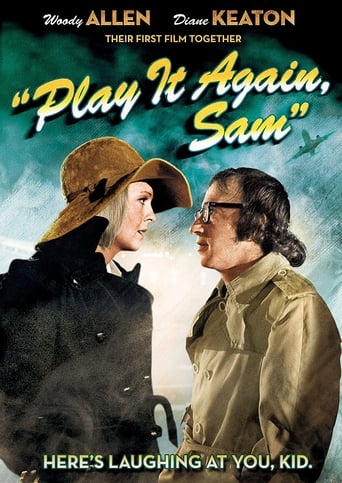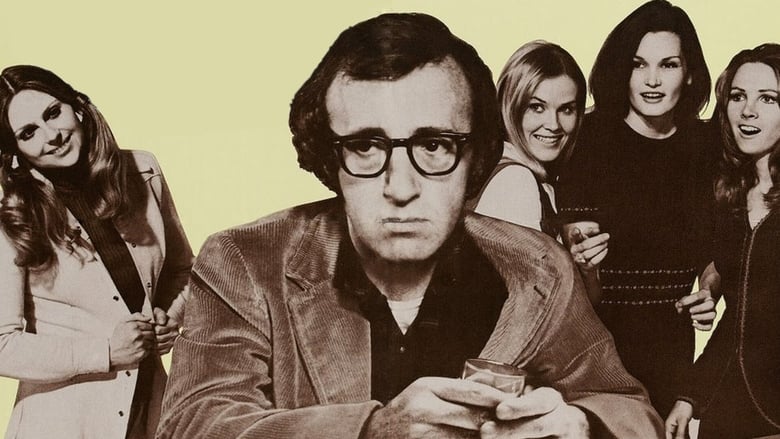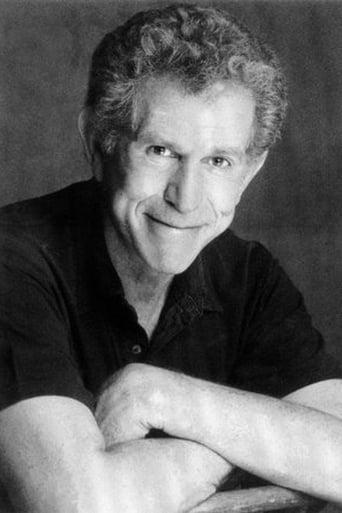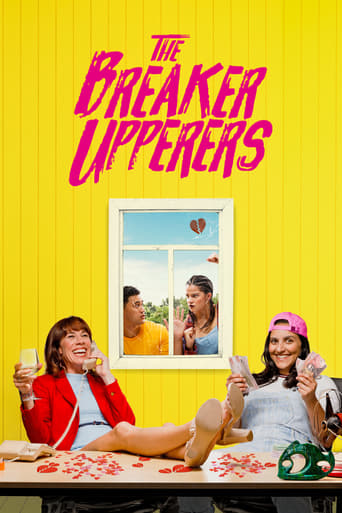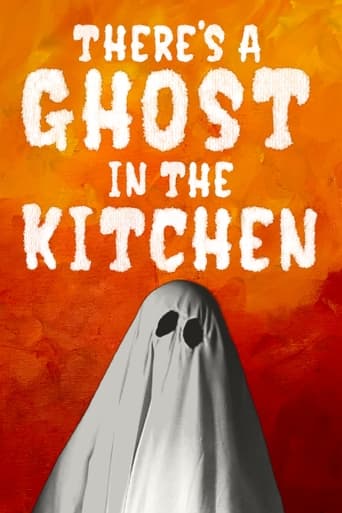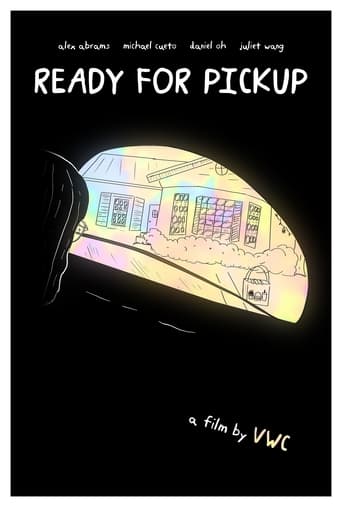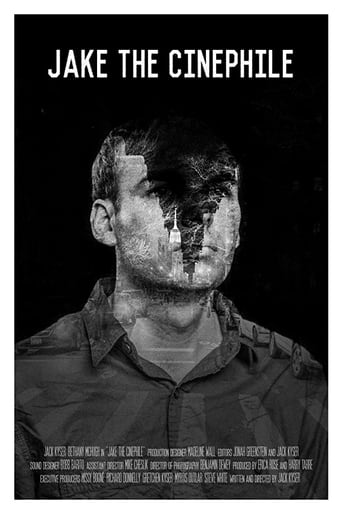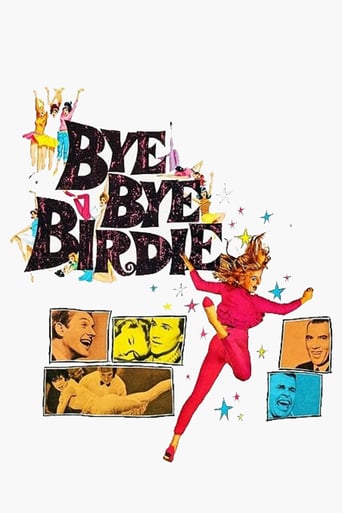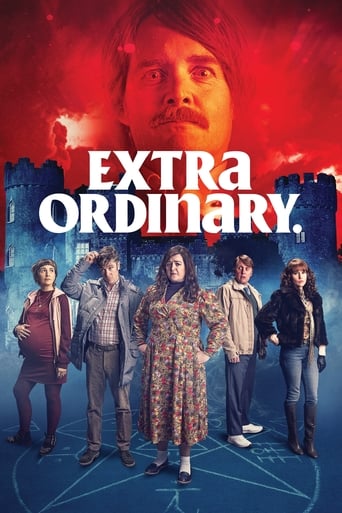Play It Again, Sam (1972)
A neurotic film critic obsessed with the movie Casablanca (1942) attempts to get over his wife leaving him by dating again with the help of a married couple and his illusory idol, Humphrey Bogart.
Watch Trailer
Cast


Similar titles
Reviews
Very Cool!!!
Absolutely the worst movie.
Fanciful, disturbing, and wildly original, it announces the arrival of a fresh, bold voice in American cinema.
Great example of an old-fashioned, pure-at-heart escapist event movie that doesn't pretend to be anything that it's not and has boat loads of fun being its own ludicrous self.
It is sort of important to note that, although this movie stars and was written (and based on a play) by Woody Allen, he did not direct it. However, I could not have guessed that unless I was told, because this movie, even within in its direction, has Allen all over it, and is often labeled as a "Woody Allen movie" rather than a "Herbert Ross movie" (although Ross has directed other famous romantic comedies like "The Goodbye Girl" and "California Suite"). Anyway, I found "Play It again, Sam" to be a pretty awesome little movie. It's not among the greatest of Allen's films, but it still is really great. The characters are likable and the story is highly engaging and entertaining. The film has many of the classic Woody Allen trademarks utilized to their finest effect; there is plenty of witty dialogue, movie reference, and comedic fantasies sprinkled all throughout this charming love story. It is sort of a "standard" vintage Woody Allen movie, but a "standard Woody Allen movie" is far and away superior to a "standard movie". Allen is a comic genius, and this early film of his shines due to its ability to expose the light of an otherwise slightly melancholy and dramatic overall story.
Right at the start of his movie-making career Allen could be truly hilarious. His jokes and mannerism were still fresh and entertaining. Coupled this with a simple plot and references to one of the great classics of all time and the result is this wonderful, funny movie.Allen plays Allan, a movie critic crushed by his divorce. He openly admits his ex-wife did not find him attractive and left him looking for greener pastures. Unfortunately, throughout the years Allen denied his unattractiveness and his jokes became stale. But here he is still in top form and very honest. His character is funny and vulnerable, therefore likable.A couple of married friends try to fix him with some dates which end disastrously. Along the way, Linda, the Keaton character sort of fall for Allan and they have one of the most hilarious "dates". Obviously, Keaton and Allen had great chemistry and the San Francisco location added an element of openness, which is not to be found int he more claustrophobic New York-based movies. Also noteworthy are the amazing clothes Keaton wears in the movie. She plays a model with excellent taste, wearing timeless outfits.The Bogey-ghost friend is very entertaining, giving absurd advice to Allan. The ending is great, managing to be both original and playing homage to Casablanca. One of the best Allen ever.
Typecasting is not always a bad thing, at least not in comedy. Think, for example, of how much mileage Charlie Chaplin was able to get out of his "little tramp" character. Woody Allen is another comic genius who has been able to get away with playing essentially the same character in most of his films and still managing to come up with a fresh angle every time. (Or, at least, almost every time).Allan Felix, Woody's character in "Play It Again, Sam" is, as anyone familiar with the great man's oeuvre will not be surprised to learn, a nervous, self-doubting, self-deprecating, angst-ridden, neurotic Jewish intellectual. (The one unusual feature is that he lives in San Francisco whereas most other Woody characters are New Yorkers. Unusually, Woody passes up the opportunity to make jokes at the expense of Californians). Allan has a lot in common with his creator, even the same first name. (Woody's real name is, of course, Allan Konigsberg). Both men share a love of jazz (Oscar Peterson composed a piece specially for the film) and an interest in the history of the cinema, especially the cinema of the forties and fifties. Allan has a love for the films of Humphrey Bogart and a particular obsession with "Casablanca", from which the title is a quotation.(Or rather a misquotation. As Woody would have been well aware, what Bogart actually says is "Play it, Sam", but at one time a lot of people mistakenly believed that he inserts the word "again" into that sentence. Today, the error has been pointed out so many times that I doubt if there is anyone left still labouring under that particular misapprehension).Allan, a film critic, has recently been through a traumatic divorce from his wife Nancy which has drained his already limited reserves of self-confidence and confirmed his already well-developed feelings of inadequacy. His great regret is that he is not, and never will be, life the cool, self-assured characters played by Bogart. Allan holds regular conversations with a ghostly Bogart who acts as his mentor, especially as regards his relationships with women.This "ghost" is probably not to be identified with the real Bogart- I doubt if Lauren Bacall would have been very impressed by lines like "I never saw a dame yet that didn't understand a good slap in the mouth or a slug from a .45"- but is rather a composite of various Bogart characters, not only Rick from "Casablanca" but also the heroes of films noirs like "The Big Sleep", "Key Largo" and "Dead Reckoning". (The film makes reference to all these and other Bogart movies).Allan's two friends Dick and Linda (a married couple) try to persuade him to go out with women again, leading to a series of hilariously disastrous blind dates. Eventually, however, Allan does find love with a woman who returns his affections. The only problem is that the woman in question is Linda herself, the wife of his best friend. Allan, Linda and Dick therefore find themselves in a situation which parallels that of Rick, Ilsa and Victor in "Casablanca". (Anyone who has not seen that film will probably miss a lot of the humour in this one).The film is unusual in the Woody Allen canon as it was, apart from "What's New, Pussycat", the only film for which Woody wrote the script but which he did not direct. (It was directed by Herbert Ross). It has certain similarities with Woody's other slapstick comedies from the early seventies, such as "Bananas" and "Sleeper"; there is, for example, a running joke about Allan's physical clumsiness. In its stress on human relationships, however, it looks forward to later, more intellectual, comedies such as "Annie Hall" and "Manhattan".As always with Woody, there is a great supply of one-liners ("I wonder if she actually had an orgasm in the two years we were married, or did she fake it that night?"), but a lot of the humour in this film is character-driven. Tony Roberts's Dick is the precise opposite of Allan, self-assured and rather insensitive. He is a successful businessman, obsessed with his work to the exclusion of all else, including his wife whom he frequently neglects. There is another running joke about his constant telephone calls to his office to inform them of the numbers at which he can be contacted at any given time. Jerry Lacy has Humphrey Bogart's voice and mannerisms off to a "T", although he does not look much like Bogart, which doubtless explains why he generally keeps his fedora hat pulled over his face.This was Diane Keaton's first appearance in an Allen film; she was to appear in several more, their professional association continuing long after their romance had fizzled out. Her Linda is a gentle soul who has much in common with Allan than she does with her workaholic husband, sharing both his neuroses and his wry sense of humour. She falls in love with Allan but is worried about hurting her husband who, although he does not show it, loves her deeply. For all Linda's eccentricities, she is clearly a loving and lovable person, and it was the ability to play characters like this that made Keaton, although not really a classical beauty, one of the sexiest actresses of the seventies."Play It Again, Sam" may lack the philosophical depth and insight into human nature of films like "Annie Hall", "Manhattan" and "Hannah and Her Sisters", but it shares their brilliant wit and humour. (The idea of Humphrey Bogart as a quasi-religious mentor and guide to life perhaps prefigures the scene in "Hannah" where Woody's character rediscovers his will to live while watching a Marx Brothers comedy).It is not, perhaps, one of Woody's truly great films, but it is not far behind. 8/10
While not Woody's best film, it is still my favorite, perhaps because I like Bogart so much, and love "Casablanca".This comic extravaganza is Woody's tribute to Bogart and Casablanca. It is filled with great comic lines and slapstick, but carries a serious undertone in it's reverence for Bogart and his movies, and particularly for Casablanca which this movie mimics in it's story of love between Woody and Diane Keaton, who is married to Tony Roberts. The essential plot of Play It Again, Sam is the plot of Casablanca set to the comedy genre.Woody schleppy, nerdy character reveres old movies, and particularly Bogart's films. As he agonizes over his problems in life and in relationships, the "ghost" of Bogart appears to him to advise him. It's not really Bogart's ghost, but the persona of Bogart that Woody carries in his own mind. He aspires to be like Bogart, but fears this is impossible. Addressing this fear, Bogart's ghost assures him that there is little Bogart in all of us. This comment is addressed to the audience as much as it is to Woody.The final scene is a hilarious takeoff on the final scene from Casablanca, and it is rendered even funnier by Woody playing it straight, until he remarks "It's from Casablanca. I've been waiting my whole life to say it." I've been waiting my whole life to say it too, but Woody has done it for me. And in doing so he made me feel that maybe, just maybe, I too could be like Bogart.

